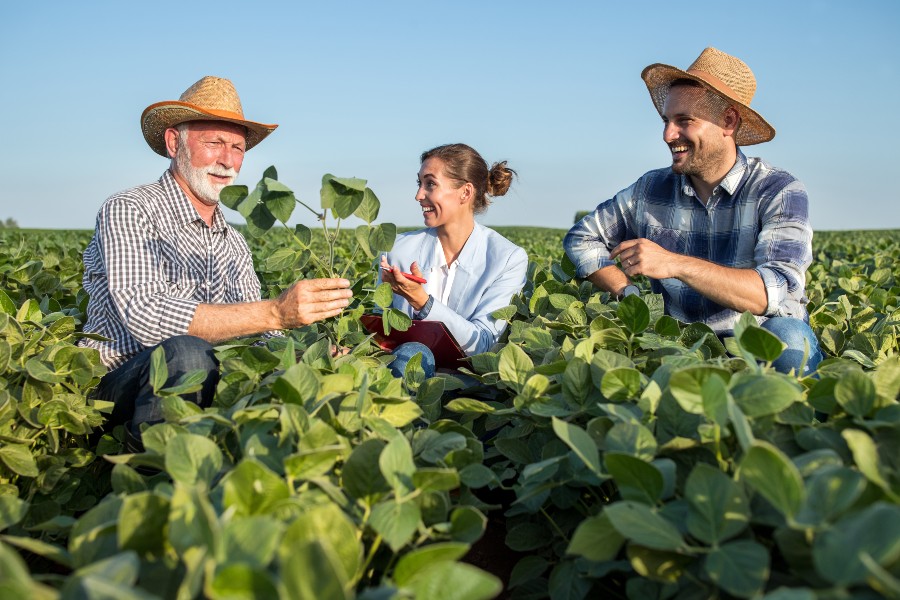Overview
I had the opportunity to attend the Plant Forward conference, held in Toronto in November 2022, which brought together delegates from over 130 different organisations and more than 20 countries, offering a real chance to develop international understanding, partnerships and good practice.
The conference included some of the key players in the plant-based sector, from researchers, funders and entrepreneurs, to multinational companies and investors.
The event, organised by Protein Industries Canada, Pulse Canada and Plant-Based Foods of Canada, provided compelling insights into the future for the sector, while also shining a light on the Canadian plant-based ecosystem itself.
From my own point of view, this was a great chance to look at opportunities to connect further with our Canadian counterparts, as well as understanding the more global direction of travel for this sector.
Day 1 – sustainability, technology and a multinational view
Day 1 started with valuable perspectives from multinational companies on the plant-based future. Key messages were the importance of taste, price and availability of plant-based products to meet consumer demand and secure repurchasing of these products.
The view was that getting consumers to try plant-based products was the easy step but securing regular repurchase was critical on these 3 parameters. There was a perceived lack of maturity across the sector, which highlighted the importance of establishing partnerships across the supply chain and the need to support scale-up from both the public and private sectors.
Understanding the challenges and opportunities of sustainability across value chains was also a key topic. With an increasing number of North Americans reporting as flexitarians, there is a large market opportunity for plant-based products – although scalability and diversity across current commodity crops (75% of the global food supply chain is reliant on just 12 crop and 5 animal species) needs to change for a wider variety of new alternative protein products able to reach the market at scale.
When it comes to introducing technology for production of novel ingredients and processing techniques, there were a number of really interesting opportunities discussed. Using artificial intelligence and machine learning to model multiple ingredient parameters simultaneously, can greatly reduce product development cycles by identifying what recipes work more effectively together.
Meanwhile, advances in processing technology for grains and pulses highlighted opportunities to separate different streams, such as gluten-free starch from legumes for foods like pasta. These protein isolation technologies can also benefit new product formulation, for example to remove off-flavours associated with pulses and generate more neutral and higher-protein raw material for alternative protein products.

Credit: Jevtic, iStock, Getty Images Plus via Getty Images
Day 2 – market trends, retailer insights and the future
After an evening of valuable networking and knowledge-sharing with delegates from funding agencies, researchers and industry, day 2 began with a focus on consumer marketplace perspectives.
The Good Food Institute shared interesting insights into opportunities to develop alternatives to animal-derived fats in plant-based products, such as cheese and ice cream.
Taking detail from their ‘State of the industry’ report, the big opportunities for plant-based products are to focus on taste and price to drive repeat purchases, a real underlying theme across the conference. It found the biggest consumer market for plant-based products is from the younger and more affluent demographic of society, which supports increasing sales forecast growth as these millennials replace older generations.
And, while the overall market continued to grow in 2022, it was still hindered to some extent by the fact that many plant-based products are still not reaching price parity just yet with meat and dairy. This challenge is one all delegates can take away to tackle.
Looking at the important learning from retailers, talks were focused on the need for a clear point of differentiation in some of the more mature plant product categories, and retail stores needing to be mindful to help consumers identify and purchase plant-based products.
Clean label was seen as increasingly valuable to consumers and any certificates such as organic or gluten-free being important to label clearly and up-front onto products to help customers identify these products. It was interesting to hear how the challenge for frozen foods to stand out is greater in this regard, as well as how the use of words such as ‘equivalent’ or ‘alternative’ actually create negative perceptions.
Any products that don’t currently have wide-spread adoption are seen as future whitespace opportunities, such as plant-based meats. In line with what we have found through our own research, there is a push from consumers to eat responsibly but barriers still exist in eating habits that are preventing these alternatives taking off.
Tackling the American tendency to eat whole cuts of meat is a challenge considered by many coming together from across the sector. Mimicking the experience of the food, such as using soy leghaemoglobin in plant burgers to recreate the idea of bleeding, was a fascinating idea for engaging consumers beyond the simple idea of replicating taste.
Finance and investment
Still day 2, but meriting its own note – ultimately the financial side of the sector will determine its rise or fall. We are now seeing a cool down across the alternative protein market, relative to the last 2 to 3 years, with investors becoming more discerning in the deals they make. But strong growth opportunities mean the plant-based sector is still regarded as a great investment opportunity.
Consumers are increasingly aware of their health and that of the environment, and see plant-based as part of the solution to this. So, while venture capital (VC) deal activity and value has dropped significantly in 2022, half of the alternative protein deals were plant-based and many of the ‘hottest’ deals were climate focused. Framing climate benefits will therefore be a sensible move for future deals.
Predictions for the future plant-based industry remain positive at $162 billion. However, there are likely to be challenges in the coming 6 to 18 months, with increased mergers and acquisitions alongside by-product commercialisation being noted as key challenges.
So, while VC has been the major funder for the sector to date, there will also be a requirement to source or leverage other forms of finance like debt and non-dilutive government grants. This is partly because exits from food companies are slower and longer than VCs may be used to for technology companies – with an education piece needed to make them aware these types of investment were longer than a 5-year play.
To support innovation in this growing sector, Innovate UK and the Biotechnology and Biological Sciences Research Council (BBSRC) have launched a £16 million competition to drive forward novel, resource efficient, low-emission food production systems. To find out more, read the UK Research and Innovation news piece, £16 million to support novel low-emission food production systems.
Take-aways
Not in a fast-food sense, but rather some of the key benefits I took from event! With similar challenges and opportunities existing across different nations and regions, especially when it came to consumer mindset and the need to tackle taste and price, there was a fantastic effort towards collaboration and knowledge-exchange throughout the event.
The Transforming Food Production (TFP) challenge already has some ties with our Canadian equivalents, so being able to discuss opportunities to work more closely and identify the relative strengths of the UK and Canadian landscapes for mutual benefit was incredibly valuable.
The international dimension to the conference also opened doors for further partnerships elsewhere in the world, as well as building an understanding of the support TFP is offering across the UK agri-food sector to those looking for an entry into our market and some of the innovators here. For such a dynamic and future-facing sector, one that ticks a range of net zero boxes, the opportunities that can be achieved through working together could be game-changing.
The Transforming Food Production challenge is delivered by Innovate UK.



